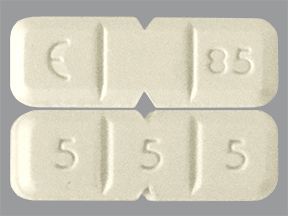Key Takeaways
- Buspirone oral tablet is used to help relieve anxiety and may be prescribed alone or in combination with other anxiety treatments like benzodiazepines, antihistamines, or SSRI-type antidepressants.
- You may see a decrease in anxiety within 2 weeks of starting buspirone, but the full effect typically takes 3-6 weeks to develop.
- Buspirone can be taken with or without food, but consistency is important. If you take it with food, always take it with food, and if you take it on an empty stomach, always take it on an empty stomach. Taking it the same way every day helps the medication work more effectively.
Buspirone oral tablet is used in adults to treat generalized anxiety disorder (commonly referred to as anxiety).
To learn more about buspirone’s uses, see the “What is buspirone used for?” section.
Buspirone tablet brand-name versions
Buspirone is a generic drug, which means it’s an exact copy of the active drug in a brand-name medication.
Generic drugs are thought to be as safe and effective as the brand-name drug they’re based on. In general, generics usually cost less than brand-name drugs do.
Read this article to learn more about the differences between generic and brand-name drugs.
Buspirone oral tablet is used to help relieve anxiety. It may be prescribed alone or in combination with another anxiety treatment. For example, buspirone may be taken in combination with certain:
- benzodiazepines, such as lorazepam (Ativan) or alprazolam (Xanax)
- antihistamines, such as hydroxyzine (Vistaril, Atarax)
- selective serotonin reuptake inhibitors (SSRIs), such as:
- sertraline (Zoloft)
- escitalopram (Lexapro)
- duloxetine (Cymbalta)
How it works
It’s not fully known how buspirone lowers anxiety levels. It decreases some of the activity of a chemical called serotonin in the brain. This decrease is thought to affect anxiety.
Like most drugs, the buspirone oral tablet may cause mild to serious side effects. The lists below describe some of the more common side effects that buspirone may cause. These lists don’t include all possible side effects.
Keep in mind that side effects of a drug can depend on:
- your age
- other health conditions you have
- other medications you take
Your doctor or pharmacist can tell you more about the potential side effects of the buspirone oral tablet. They can also suggest ways to help reduce side effects.
Mild side effects
Here’s a list of some of the mild side effects that buspirone can cause. To learn about other mild side effects, talk with your doctor or pharmacist, or read buspirone’s prescribing information.
Mild side effects of buspirone oral tablet that have been reported include:
- drowsiness
- dizziness or lightheadedness
- nausea
- headache
- excitement or nervousness
Mild side effects of many drugs may go away within a few days to a couple of weeks. But if they become bothersome, talk with your doctor or pharmacist.
Serious side effects
Call your doctor right away if you have serious side effects. Call 911 if your symptoms feel life threatening or if you think you’re having a medical emergency.
Serious side effects can include the following:
- Heart or cardiovascular effects, such as:
- fast heart rate
- palpitations (feeling like your heart is skipping a beat)
- chest pain
- low or high blood pressure
- fainting
- Trouble with coordination (controlling your movements).
- Outbursts of anger.
- Serotonin syndrome. Symptoms can include:
- confusion
- large pupils
- fast heart rate
- high blood pressure
- fever
- excessive sweating
- rigid muscles
- nausea or vomiting
- seizure
Allergic reaction
For some people, buspirone oral tablets can cause an allergic reaction. But it’s not clear whether this side effect occurred in the drug’s studies.
In general, symptoms of allergic reaction can be mild or serious.
What might help
If you have mild symptoms of an allergic reaction, such as a mild rash, call your doctor right away. They may suggest a treatment to manage your symptoms and can determine whether you should keep taking buspirone.
If you have symptoms of a severe allergic reaction, such as swelling or trouble breathing, call 911 or your local emergency number right away. These symptoms could be life threatening and require immediate medical care.
If your doctor confirms you’ve had a serious allergic reaction to buspirone, they may have you switch to a different treatment.
Your doctor will recommend the dosage of buspirone oral tablet that’s right for you. Below are commonly used dosages, but always take the dosage your doctor prescribes.
Form and strengths
Buspirone comes as a tablet that you swallow. It’s available in the following strengths:
- 5 milligrams (mg)
- 7.5 mg
- 10 mg
- 15 mg
- 30 mg
Recommended dosages
Your doctor will recommend the dosage of buspirone oral tablet that’s right for you. Below are commonly used dosages, but the dosage you receive will be determined by your doctor.
Dosage for anxiety disorders
The typical starting dosage of buspirone oral tablet for anxiety is 15 mg daily. You’ll likely take this as one 7.5 mg tablet, twice per day.
Every 2 to 3 days, your doctor may increase your dosage by 5 mg, up to a maximum of 60 mg per day. They’ll adjust your dosage based on how effective the drug is for you and whether you experience any side effects from buspirone. Ultimately, your doctor will prescribe the lowest dosage that provides the desired effect.
How to take
Your doctor will explain how you should take the buspirone oral tablet. They’ll also explain how much to take and how often. Be sure to follow your doctor’s instructions.
Buspirone comes as a tablet that you swallow. If necessary, the tablets can be split.
You can take buspirone oral tablets with or without food. However, it’s important to be consistent. This means that if you take buspirone with food, you should always take it with food. And if you take it on an empty stomach, you should always take it on an empty stomach. This is because food can affect how your body processes buspirone. Taking your dose consistently with or without food can help buspirone work more effectively.
Questions about taking buspirone oral tablet
Below are some common questions about taking buspirone oral tablet.
- Can buspirone be chewed, crushed, or split? Yes, buspirone tablets may be split into two or three pieces, depending on the tablet’s strength. You may need to split your tablet in order to take the dosage your doctor prescribes. It’s not known whether buspirone tablets can be crushed or chewed. If you have difficulty swallowing tablets, talk with your doctor about other options.
- What if I miss a dose of buspirone? Take your dose as soon as you remember. But if you remember just a few hours before your next scheduled dose, take only one dose. Never try to catch up by taking two doses at once. This could result in dangerous side effects.
- Will I need to take buspirone long term? Buspirone oral tablet is used for short-term or long-term treatment. The length of therapy depends on the condition being treated. This drug comes with risks if you don’t take it as prescribed.
- How long does buspirone take to work? When taking this drug, you may see a decrease in your anxiety within 2 weeks. However, you likely won’t see the full effect of the drug until 3 to 6 weeks after you start taking it.
Overdose
Do not take more buspirone than your doctor prescribes, as this can lead to harmful effects.
Symptoms of overdose
- seizure
- drowsiness
- dizziness
- nausea
- vomiting
What to do in case you take too much buspirone
Call your doctor if you think you’ve taken too much buspirone. You can also call 800-222-1222 to reach America’s Poison Centers or use its online resource. But if you have severe symptoms, immediately call 911 or your local emergency number. Or go to the nearest emergency room.
Buspirone oral tablet can interact with other medications, vitamins, or herbs you may be taking. An interaction is when a substance changes the way a drug works. This can be harmful or prevent the drug from working well.
To help avoid interactions, your doctor should manage all of your medications carefully. Be sure to tell your doctor about all medications, vitamins, or herbs you’re taking. To find out how this drug might interact with something else you’re taking, talk with your doctor or pharmacist.
Examples of drugs that can cause interactions with buspirone are listed below.
Antibiotics
Taking certain antibiotics with buspirone can increase the levels of buspirone in your body. This raises your risk of side effects. Your doctor may change your dosage of buspirone if you’ll be taking it with one of these drugs. Examples of these antibiotics include:
- erythromycin
- clarithromycin
Antidepressant drugs
Taking certain drugs used to treat depression with buspirone can increase the levels of buspirone in your body. This raises your risk of side effects. Your doctor may change your dosage of buspirone if you’ll be taking it with one of these drugs.
Examples of these drugs include:
- nefazodone
- monoamine oxidase inhibitors (MAOIs), which can also increase your risk of high blood pressure. Examples of these drugs include:
- selegiline
- isocarboxazid
- phenelzine
- tranylcypromine
Taking other drugs used to treat depression with buspirone raises your risk of serotonin syndrome. Symptoms of this condition can include rigid muscles, high fever, sweating, nausea, and vomiting. Examples of these antidepressant drugs include:
- fluoxetine
- paroxetine
- escitalopram
- citalopram
- sertraline
- amitriptyline
- mirtazapine
Antifungal drugs
Taking certain drugs used to treat fungal infections with buspirone can increase the levels of buspirone in your body. This raises your risk of side effects. Your doctor may change your dosage of buspirone if you’ll be taking it with one of these drugs.
Examples of these antifungal drugs include:
- itraconazole
- ketoconazole
- fluconazole
- voriconazole
Antiseizure drugs
When taken with buspirone, certain drugs used to treat seizures can lower the amount of buspirone in your body. This can make buspirone less effective, and it may not work as well to treat your anxiety. Your doctor may change your dosage of buspirone if you’ll be taking it with one of these drugs.
Examples of these seizure drugs include:
- carbamazepine
- phenobarbital
- phenytoin
High blood pressure drugs
Taking certain blood pressure drugs with buspirone can increase the levels of buspirone in your body. This raises your risk of side effects. Your doctor may change your dosage of buspirone if you’ll be taking it with one of these drugs.
Examples of these blood pressure drugs include:
- diltiazem
- verapamil
HIV drugs
Taking certain drugs used to treat HIV with buspirone can increase the levels of buspirone in your body. This raises your risk of side effects. Your doctor may change your dosage of buspirone if you’ll be taking it with one of these drugs.
Examples of these HIV drugs include:
- ritonavir
- atazanavir
- darunavir
- lopinavir/ritonavir
Other drugs
Rifampin: Rifampin is used to treat tuberculosis and other infections. When taken with buspirone, rifampin can lower the amount of buspirone in your body. This can make buspirone less effective, and it may not work as well to treat your anxiety. Your doctor may change your dosage of buspirone if you’ll be taking it with rifampin.
Dexamethasone: Dexamethasone is a corticosteroid drug. It’s used to treat conditions such as immune disorders and skin, eye, or respiratory problems. When taken with buspirone, dexamethasone can lower the amount of buspirone in your body. This can make buspirone less effective, and it may not work as well to treat your anxiety. Your doctor may change your dosage of buspirone if you’ll be taking it with dexamethasone.
This drug comes with several warnings.
Food interactions warning
During your treatment with buspirone, avoid drinking large amounts of grapefruit juice or eating large amounts of grapefruit. Grapefruit can increase the amount of buspirone in your body. This raises your risk of side effects. Most people can consume small amounts of grapefruit or grapefruit juice (one serving 2 to 3 times per week) without problems.
Alcohol interaction warning
Buspirone can cause drowsiness. Drinking alcohol while taking this drug can cause slowed reflexes, poor judgment, and sleepiness, which can be dangerous.
Warnings for people with certain health conditions
For people with severe kidney damage: You should not use buspirone. Your kidneys clear buspirone from your body. If they’re not working well, the amount of buspirone in your body can increase to dangerous levels.
For people with severe liver damage: You should not use buspirone. Your liver processes buspirone in your body. If it’s not working well, the amount of buspirone in your body can increase to dangerous levels.
Warnings for other groups
Taking buspirone during pregnancy: Buspirone is a category B pregnancy drug. That means two things:
- Research in animals hasn’t shown a risk to the fetus when the mother takes the drug.
- There aren’t enough studies done in humans to show if the drug poses a risk to the fetus.
Talk with your doctor if you’re pregnant or planning to become pregnant. Animal studies don’t always predict the way humans would respond. Therefore, this drug should only be used in pregnancy if clearly needed.
Taking buspirone while breastfeeding: It’s not known whether buspirone passes into breast milk or how it may affect a child who is breastfed. Talk with your doctor if you breastfeed your child. You may need to decide whether to stop breastfeeding or stop taking this medication.
Older adults: The kidneys of older adults may not work as well as they used to. This can cause your body to process drugs more slowly. As a result, a higher amount of a drug stays in your body for a longer time. This raises your risk of side effects.
For children: There is no information available on how safe or effective buspirone is for long-term use in children. Don’t use this drug in children younger than 18 years.
Whether you have health insurance or not, cost may be a factor when you’re considering buspirone. What you’ll pay for buspirone may depend on several things, such as your treatment plan and the pharmacy you use.
Here are a few things to consider regarding cost:
- Cost information and savings coupons: You can visit Optum Perks to get price estimates of what you’d pay for buspirone when using coupons from the site. See the coupon options below. (Note: Optum Perks coupons cannot be used with any insurance copays or benefits.)
Learn more about saving on your prescriptions.
Optum Now is owned by RVO Health. By clicking on this link, we may receive a commission. Learn more.
There are other drugs available to treat your condition. Some may be better suited for you than others. Talk with your doctor about other drug options that may work for you.
Disclaimer: Healthline has made every effort to make certain that all information is factually correct, comprehensive, and up to date. However, this article should not be used as a substitute for the knowledge and expertise of a licensed healthcare professional. You should always consult your doctor or another healthcare professional before taking any medication. The drug information contained herein is subject to change and is not intended to cover all possible uses, directions, precautions, warnings, drug interactions, allergic reactions, or adverse effects. The absence of warnings or other information for a given drug does not indicate that the drug or drug combination is safe, effective, or appropriate for all patients or all specific uses.


















